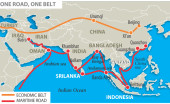Molly Minturn - My family is heartbroken to share that my father died in surgery on Monday, Feb. 10. It…
Wednesday Night #1289
Written by Diana Thebaud Nicholson // November 15, 2006 // Canada, Environment & Energy, Herb Bercovitz, Immigration/migration, Microcredit, Politics, Population, Public Policy, Reports, U.S., United Nations, Wednesday Nights // Comments Off on Wednesday Night #1289
We hope that some of you were able to attend the Millennium Promises Conference last Thursday, and at the very least, that you followed the extensive media coverage of what proved to be an impressive and very successful event. Bill Clinton was amazing, as was Jeffrey Sachs, but the co-chairs, Belinda Stronach & Rick Mercer, along with organizer Daniel Germain, all deserve great credit.
WELL! It’s a new era south of the border and none too soon for many of us. In our opinion, one of the best commentaries is in the Economist which concludes “Though the Democrats have dealt him a mighty blow, the biggest problems that face Mr. Bush today are exactly the same as they were last week: Iran’s growing ambitions, Kim Jong Il’s unpredictable dictatorship and, above all, the ongoing disaster in Iraq. Mr. Bush’s allies abroad may be forgiven for taking some pleasure in his humiliation. But they have a strong interest in making sure that American power is not too diluted. The radical Islamists and rogue states who wish America harm are no more benevolent when it comes to the rest of the civilised world.” More on George W. Bush
We were somewhat surprised to learn that Canada’s Liberals have invited Howard Dean to be the keynote speaker. Was there really no-one else? But then we learned that Canada’s Liberals are not alone: Britain’s Labor Party has also enlisted his help in boosting that party’s flagging fortunes before the local elections in May. We heard friend Beryl Wajsmann tonight on this subject with Raymond Heard – both sniping at the decision to invite Dean, with Ray Heard hissing the “S word” – socialists – and wondering aloud why John Turner had not been the invited keynoter. It seems to us the answer is obvious: Howard Dean, for all his perceived faults, was the Chairman of the winning party [in the congressional elections].
This may be the swan song for leadership conventions as we have known them – from here on even the Liberals will join the electronic age – but we confess to a bit of nostalgia for the drama of the (no longer) smoke filled rooms crowded with deal makers. Nonetheless, it looks like this Liberal Leadership Convention won’t be dull.
Wait … just as we are speaking of swan songs for leadership conventions: In France, the mainstream left and right have both opted for an American-style primary, with a vote of party members. The Socialists will choose one of Ségolène Royal, Dominique Strauss-Kahn or Laurent Fabius on November 16th.
Speaking of meetings filled with drama and deal-making, the Climate Change Conference of the Parties is on in Nairobi. With input like the Stern Review on the economics of climate change, there is bound to be (dare we say) heated discussion.
Meantime, at a local (Canadian) level, there is the drama of a Minister of Environment who has excluded practically everyone from the official delegation, while the excluded ones, including Quebec’s minister of sustainable development have simply gone (to) it alone. Among other Canadian issues, the report released at the Conference that voracious water consumption by Alberta’s tarsands threatens the quality and quantity of water available to Saskatchewan and the Northwest Territories through the Mackenzie River system.
And in Wednesday Night’s usual timely fashion, we are delighted to welcome back our friend, former colleague and resident Drylands expert, Juliane Zeidler from Namibia, who we hope will have much to say about Climate Change and Africa.
One item that may have escaped the attention of all but the most devoted China watchers: Beijing families were first restricted to one child, and now the Chinese authorities have set the limit on pets too with its one dog policy. China’s capital will institute a “one dog” policy for each household in nine areas, the official Xinhua News Agency reported on Wednesday. Robert Travers should be with us to comment.
It’s the usual Wednesday Night tour du monde – possibly tour de force –
The Report
The welcome return of Juliane Zeidler, drylands expert, formerly of the Convention on Biological Diversity, and now the founder of a successful consulting firm in Namibia, ensured that a good part of the evening would be devoted to issues of the Climate Change conference in Nairobi. However, Canadian policy and politics were accorded a generous share of the discussion.
Immigration
Of all the leadership candidates, it is Gerard Kennedy who has taken the strongest position on the flaws of Canadian immigration policy, citing the immigrant success gap and pointing his finger at the oft-discussed [at Wednesday Night] problem that Canada makes every effort to attract the best and the brightest but then doesn’t make use of their skills and talents. One cause for optimism is that the Quebec government is beginning to introduce equivalency programs, allowing talented professionals to earn their equivalency relatively quickly and painlessly.
Other points made around the table include the denial of refugee status after long periods of time, sending them back to face danger in their countries of origin (with the possibility that they will be even more targeted when it is known that they have sought and been denied refugee status in Canada).
There is, it is recognized, some abuse of the system, notably those immigrants who use the birth of a Canadian child as a passport to bring in an entire family. Another group comprises investor immigrants who although they receive Canadian passports don’t participate in Canadian society. This is reprehensible but certainly not illegal as they have passed the thresholds set by our country.
Some personal experiences would seem to indicate that following the rules is not enough for a new immigrant; immigration bureaucrats tend to bully those who seek information about their status until and unless the immigrant suggests that s/he might be better off seeking the assistance of an immigration lawyer.
While much attention is given to the problems of the unrecognised professional qualifications of the sought-after immigrants, there is a great need in this country for skilled trades people. The system should recognize the need and develop a system to award points for individuals with those skills.
The Liberal leadership race (continued)
On the anniversary of the first PQ election (1976), inevitably talk turned to the Liberal leadership and the Quebec voter with the usual divided opinions on the significance to Quebec of a fluently bilingual presentation over substance. While there is genuine admiration for the intellectual depth of Michael Ignatieff, there remains considerable reticence concerning his knowledge of how politics functions in Canada. Another view is that it is the deep-seated Canadian distrust of success abroad (Harvard professor) enters into the argument, rather than a genuine analysis of potential. Whatever else may be said, it is Ignatieff who is the lightening rod for any discussion of the leadership race on Wednesday Night.
Climate Change
The whole focus of the Climate Change Conference this week has been on adaptation to the changes in Africa, while Canadians seem to be totally hung up on their own political issues. There is legitimate debate at the scientific level on the rate at which climate change is happening, however the big danger today is the popularisation of the issue in the media, without sufficient attention being paid to the underlying, valid, scientific debates. It should be recognized that there is propaganda on both sides and the average person is confused by claims that the current warming is unprecedented, when other experts cite an equally warm era during the Middle Ages. The key point is that this is the first human-induced change and infinitely more rapid than those that preceded it.
Big business and investors are paying attention to environment issues and are asking many more questions about environmental impact, social responsibility and related spin-offs than was ever the case in the past.
Microcredit and poverty alleviation
The award of this year’s Nobel Peace Prize to the head of Bangladesh’s Grameen Bank, Muhammad Yunus, is a major event, signalling a fundamental change in economic views and the realization that empowerment of the unempowered is crucial if development initiatives are truly to bear fruit. As has been previously discussed in this room, the spirit of entrepreneurship is not limited to the well educated and privileged; the only limitation to success has been the lack of initial capital. The success rate of the borrowers of micro credit – and the repayment levels – attests to the wisdom of this approach to poverty alleviation. As poverty is alleviated, the opportunities for children’s, and particularly girls’, education increase. This trend in turn will lead to limits of population growth, which is the single greatest menace to the survival of our planet.
We live in a world “where we are drawing on … resources faster than they can be restored, and we are releasing wastes and pollutants faster than the Earth can absorb them or render them harmless. They are leading us toward global environmental and economic collapse -but there may still be time to address these problems and soften their impact.” We must not ignore Limits to Growth, first published over 30 years ago by Dennis Meadows et al, and recently updated
- Almost every Canadian is an immigrant
- Does it [climate change] all boil down to a question of efficiency? Cleaner machines requiring less oil, systems that generate less waste, etc?
- Ignatieff is a brilliant intellectual, but he’s not what we need – we need a Bob Rae
- I believe Ignatieff is really strong in Quebec – he’s a new personality, not associated with the Chrétien/Martin regimes
- But Bob Rae has the whole Chrétien camp behind him
- Stéphane Dion is too stubborn to play kingmaker
- Rona Ambrose comes in [to the Climate Change conference] and has the pettiness to use an international forum for the [airing of] domestic issues
- You can’t impose costs that drive business out of the marketplace
- To satisfy our Kyoto requirements, we would be sending money to Russia to subsidize our unreduced emissions because Russia has closed down its polluting industries which were uncompetitive
- International bodies don’t work in great leaps – they work in inches



